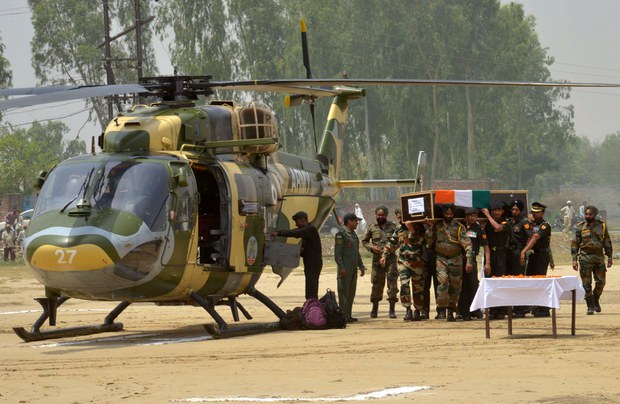Indian Army Kills 2 Pakistani Soldiers on Kashmir Border
2017.05.26
Srinagar, India
 Indian Army personnel in Amritsar, India carry the coffin of Paramjeet Singh, one of two soldiers allegedly killed by Pakistani troops in Kashmir, May 2, 2017.
Indian Army personnel in Amritsar, India carry the coffin of Paramjeet Singh, one of two soldiers allegedly killed by Pakistani troops in Kashmir, May 2, 2017.
The Indian Army said Friday its soldiers had killed two members of the Pakistani army’s elite Border Action Team (BAT) along the disputed border in Kashmir, in an exchange of gunfire amid rising tensions between the two nuclear-armed rival nations.
Tensions have escalated since India accused the BAT of beheading two Indian soldiers on May 1 after members of the Pakistani unit had allegedly infiltrated Indian Kashmir by crossing the Line of Control (LoC), a de facto border that divides the Himalayan region between the two countries. The armies from the two sides have since regularly traded cross-border fire.
The BAT team was moving in a suspicious manner along the LoC and attempted to target an Indian Army post in the Uri sector of Baramulla district, the Indian Army said.
“The alert Indian Army patrol that came under attack acted swiftly, killing two BAT attackers,” army spokesmen Col. Rajesh Kalia told BenarNews., adding that the Indian Army was “always prepared to give a befitting reply” to ceasefire violations from across the border.
The bodies of the Pakistani soldiers have been recovered, a police official said.
“Some weapons, including a pistol and a Pakistan-made automatic rifle were recovered from the slain attackers. An intermittent exchange of fire between the Indian Army and BAT soldiers is still on,” the official, who did not wish to be named, told BenarNews.
On Tuesday, the Indian Army on Tuesday said it attacked Pakistani posts along the LoC, a claim denied by Pakistan.
Similar skirmishes between the two armies since earlier this month have left at least three Indian and two Pakistani civilians dead and forced more than 2,000 Indians to vacate villages situated on the border.
India and Pakistan have fought three full-blown wars – two of them over Kashmir – since the partition of the Indian sub-continent in 1947.
Kashmir, which is claimed in its entirety by India and Pakistan, has been grappling with a separatist insurgency that has claimed over 70,000 lives since the late 1980s.







